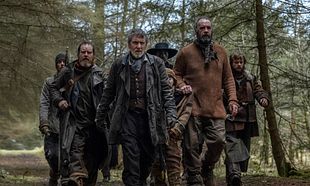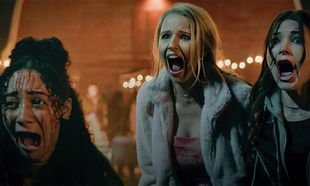Coming from poverty, courtesan Jeanne Du Barry (Maiwenn) is introduced to Louis XV (Johnny Depp) and begins an intimate affair with him. Though at first their romance seems blissful, the court and the family surrounding Louis XV begins to scheme the downfall of Jeanne Du Barry, who is seen as far too headstrong and egalitarian for French aristocracy...
Leaving aside whatever opinions one might have of Johnny Depp's recent legal escapades, his career leading up to them has been spotty at best. While he maintained some independent roles along the way, such as 'Waiting For The Barbarians' or 'Minimata' (that somehow clawed its way into the 2020 Oscars ceremony through a deeply weird online campaign), Depp seem resigned to starring in uninteresting blockbusters like 'Fantastic Beasts' and 'Murder On The Orient Express' in the wake of his stint as Jack Sparrow. In the aftermath of said legal escapades, a meaty role like Louis XV - the penultimate royal before the French Revolution - would seem like exactly like the kind of thing to knock back the naysayers and get him back on track as an astute and serious performer.
Yet, for much of 'Jeanne Du Barry', Depp and his character are virtually non-existent. He appears in a cloud of courtiers, grunts a line or two in French, and is then shuffled off to somewhere else while everyone talks about him in hushed and concerned tones. Maiwenn, who's pulling treble duty here as star, director, and co-writer, is instead the focus of the movie and through her, we see the world of Louis XV. As you'd expect, the baroque splendour of Versailles just eats up the screen at every opportunity, and the cinematography by Laurent Dalliand and editing by Laure Gardette makes every possible use of it. The costumes, equally, play a vital role in expressing how wondrous and beautiful this time period was, and whole scenes are devoted to introducing characters in their pomp and circumstance.
Other than that, however, 'Jeanne Du Barry' is painfully dull. Depp's performance barely registers underneath the mountain of makeup that's caked on his stern visage. Maiwenn, meanwhile, tries to portray Jeanne as a knowing coquette, but at the same time, she's clearly a calculating social climber. The results are mixed, which doesn't even cover half of it when it comes to the ideas surrounding aristocracy. Jeanne Du Barry is presented as a patron of the arts, a lover of beauty in all of its forms and empathetic to royalty, yet modern in her utilisation of her sexuality and her savvy. Yet, for all of this, the movie entirely neglects the rampant social inequality in France, and the degradation that a vast number of people were living under at this time. It bypasses it entirely, instead focusing on the romance and the spectacle of it all.
While 'Jeanne Du Barry' takes clear inspiration from Stanley Kubrick's 'Barry Lyndon', with its ornately constructed shots and slow zooms, Maiwenn's direction neglects to take in the pomposity of it all. It's playing it all totally straight, in love with the beauty but ignoring what it took to make. Moreover, for a movie that is presented on the surface as this progressive endeavour, it's really quite conservative in its execution and sentiments. It may have beauty, but it has little in style and even less in substance.



















































































